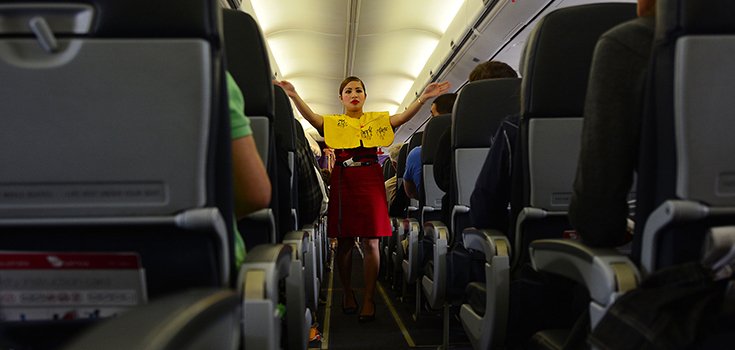Study: Flight Attendants Have Higher Levels of Different Types of Cancer

A study shows that flight attendants get more uterine, thyroid, and other cancers than the general population. The question is, “Why?” [1]
Scientists have known for years that flight attendants get more breast cancer and melanoma skin cancer than the general population. Unfortunately, the latest study found the same trend when it came to every other type of cancer the researchers looked at among flight attendants: Non-melanoma skin cancer, uterine, gastrointestinal, cervical, and thyroid cancers.
Study co-author Irina Mordukhovich, a research associate at the Harvard T.H. Chan School of Public Health, said:
“Something that somewhat surprised us, to some extent, was that we also saw a higher instance of breast cancer in women with three or more children.”
Read: Could Eating This Mushroom Protect Against Radiation?
Among the general population, having more children is associated with a lower risk of breast cancer. A previous study found a higher risk of the disease among flight attendants, but Mordukhovich said she was surprised to see those findings replicated in the new study.
“Women with 3 or more children are already probably not getting enough sleep. Combine that with this disruption from the job, especially for those who fly internationally, this may be an indication that the circadian rhythm disruption is having an impact.”
The Harvard Flight Attendant Health Study (FAHS) began in 2007. It included more than 5,300 flight attendants who were recruited online and mailed surveys. Some were also given surveys in person at airports.
Respondents answered questions about their flight schedules and any diagnoses of cancer. The researchers then compared those responses to those from a matched group of people not in the airline profession from an ongoing national health survey. [2]
Read: Flaxseeds Found to Protect the Body Against Radiation
Mordukhovich said her team was especially struck by the prevalence of breast, melanoma, and non-melanoma cancers. Compared with the general public, flight attendants had a:
- 51% higher prevalence of breast cancers
- More than 2-fold higher prevalence of melanoma
- 4-fold higher prevalence of non-melanoma skin cancers
Mordukhovich said:
“Flight attendants are considered a historically understudied occupational group, so there is a lot we don’t know about their health. What we do know for sure is the exposures that both pilots and flight attendants have—the main one being high radiation levels because of cosmic radiation at altitude.”
People who fly occasionally probably have nothing to worry about, but the study suggests that people who fly regularly for work may be at greater risk for health problems.
The higher risk of cancer among flight attendants could also be linked to cosmic radiation. Cosmic radiation originates in space, but small amounts reach earth. People have a greater chance of being exposed to higher levels of cosmic radiation at higher altitudes. The International Agency for Research on Cancer (IARC) determined that ionizing radiation, like that found in cosmic radiation, can be carcinogenic to humans.
Flight crew workers are exposed to the largest annual dose of radiation among U.S. radiation workers, according to the National Council on Radiation Protection and Measurements. However, no limitations or regulations exist in the U.S. on how much exposure is safe for flight attendants. In the European Union (EU), flight attendant schedules and the flying time of pregnant flight attendants is regulated to cut down on potentially-dangerous exposures.
The results need to be replicated in other groups to confirm the risk, Mordukhovich said, but flight attendants ought to be concerned about their cancer risk. Also, it’s possible that pilots face similar risks, but the study only looked at flight attendants.
The findings are especially jarring, considering that data show that flight attendants tend to be healthier than the general population. They are less likely to smoke or be overweight, and they have lower rates of heart disease.
Mordukhovich said:
“The fact that we are seeing higher cancer rates in this study population is definitely striking. We hope the study highlights issues about exposures that we know are problematic for flight attendants and pilots and aren’t currently being addressed. We have known carcinogens that flight crews are exposed to, and we’re hoping that this study allows people to start thinking about what should be done to implement protections.”
The study appears in the journal Environmental Health.
Sources:
[1] CNN
[2] Time
